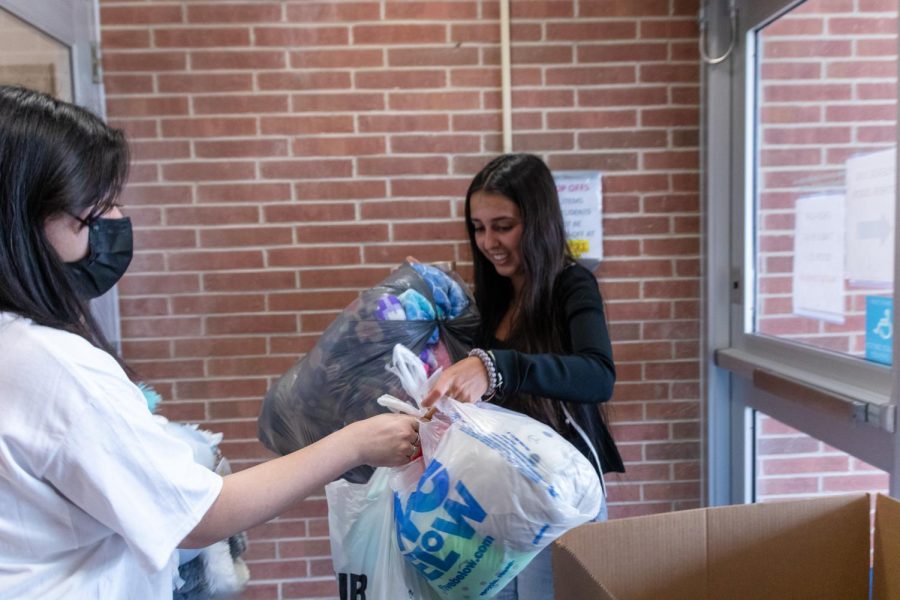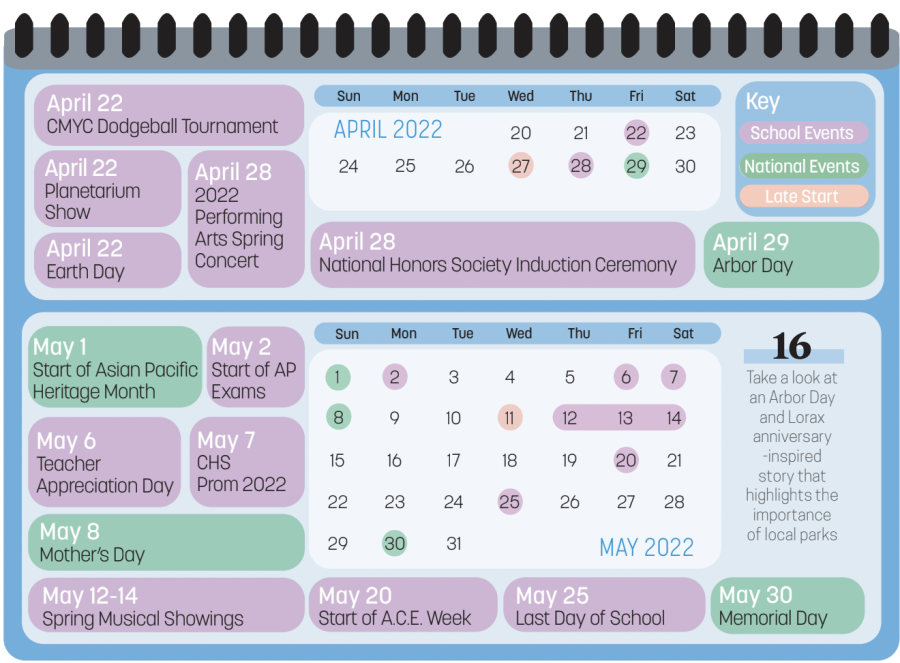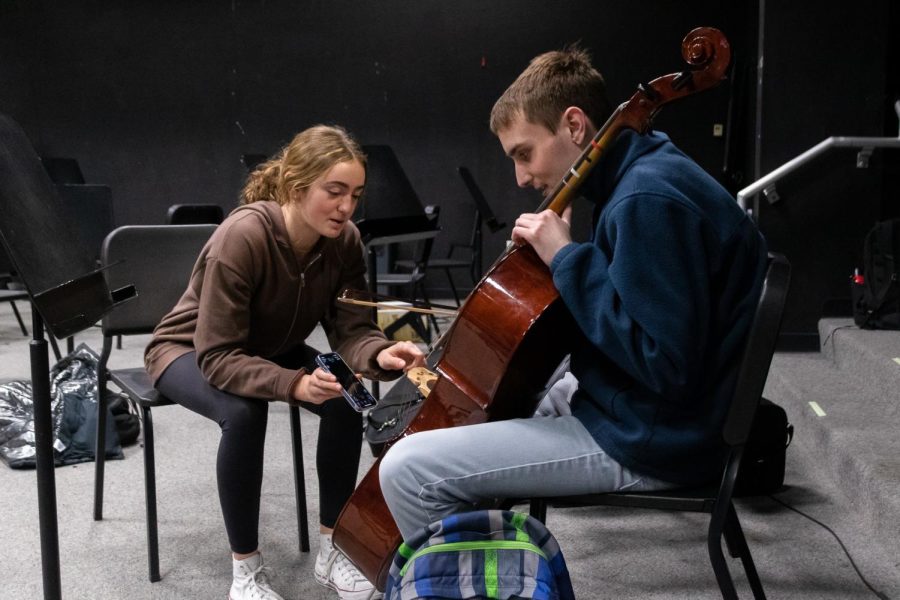Ishaan Singh, United Sound President

Q: First of all, can you give me a brief overview of the United Sound club?
A: We have nine new musicia
ns this year, and we just teach them how to play music. I think we have about 36 peer mentors and basically four mentors and just one musician form a group every meeting, and we just play various music. Sometimes we’ll play rhythm, sometimes we’ll play actual songs, but we just teach them how to play music.
Q: What type of instruments do you guys teach?
A: At our school, it’s just string musicians, but nationally it’s for band and other instruments as well. But I think we have five people playing cellos and three playing violin and one playing viola.
Q: How often do you guys meet?
A: We meet every Wednesday for 45 minutes.
Q: What led you to join the club and then pursue a leadership position?
A: The orchestra director was advertising the club to the orchestra students, and I just thought it sounded kind of fun to do. So I joined it last year as a mentor, and then near the end of the year they were just asking about people that wanted to be the presidents for the next year. I just thought that might be like a good leadership position to have.
Q: Why do you think that initiatives like this that seek to connect different groups and help the disabled are important?
A: Otherwise, these kids wouldn’t really have access to music and things like that. It’s really nice during meetings to just see the smiles on their faces, and it’s just a really fun experience for both the mentors and the musicians because everyone’s having a lot of fun.
Q: How would you say that music can serve to bridge gaps and connect people?
A: The ability for the mentors to just be there with the musician as they learn their instruments and see that progress, since the matches themselves are also learning their insurance at the same time, seeing that experience in someone else in the joy can create really gives a nice connection between the mentors and the musicians in United Sound.
Q: How would you describe the atmosphere of the club?
A: It’s a really positive environment, everyone’s always really happy. People have a really, really fun time, both the mentors and the musicians.
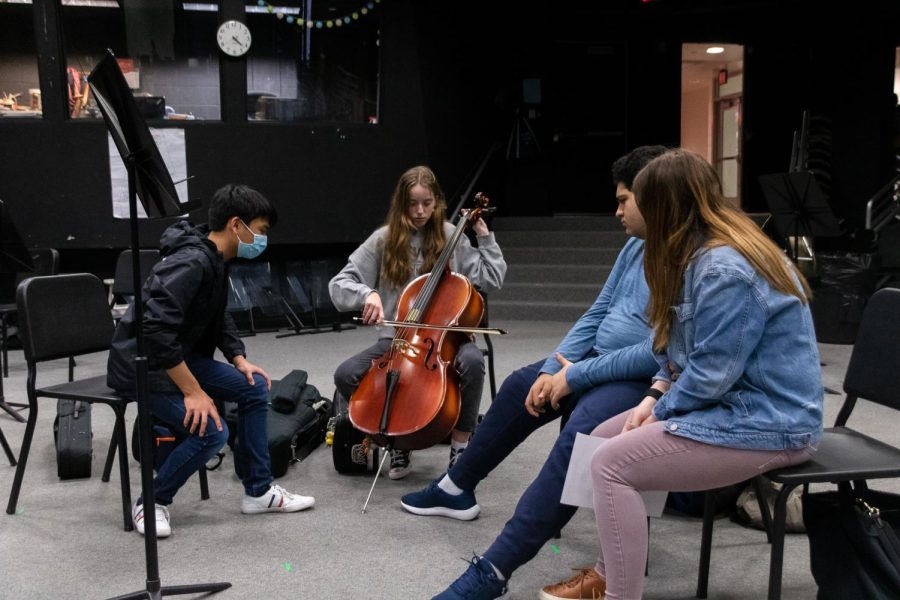
Q: Can you also describe the role that music plays in your life specifically?
A: Music is a pretty important part of my life. I’ve been playing the piano for a really long time and the cello since sixth grade. For me, music is just something really important to de-stress and have fun in life, and the fact that I can use it as a volunteer activity like this is also a really nice bonus. Music is just overall important.
Q: Why do you think students should join the club or participate?
A: It’s a good community service activity if you’re looking for something to give back to the community, but also just a really fun thing you can do. It’s not very time-consuming at all; for most members, just 45 minutes once a week. It’s just a really fun environment for everyone that’s there.
Q: How can interested students participate?
A: At the beginning of each school year, the orchestra director will put out a flyer that you can scan a QR code on or something, and then you’ll be able to just join through there.
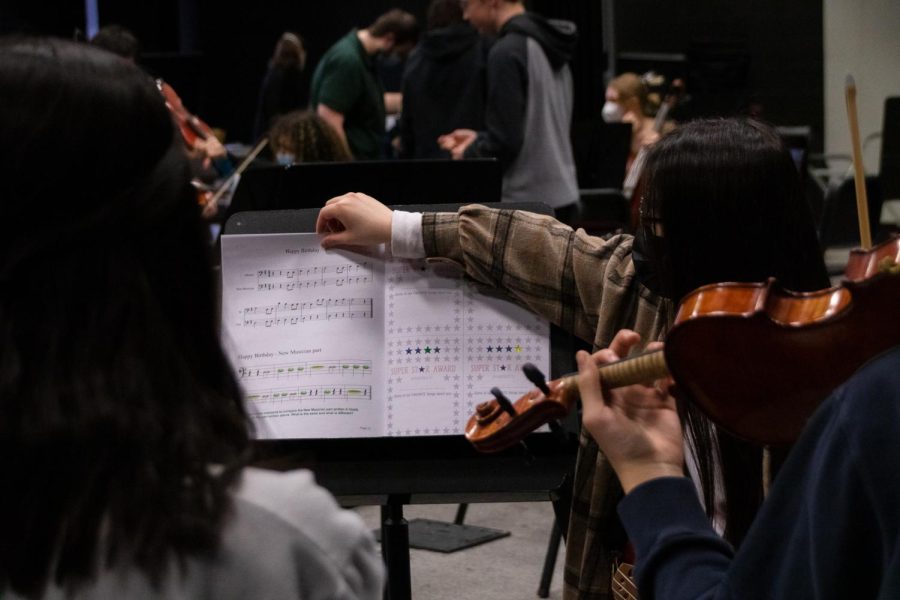
Margaret Hite, United Sound Sponsor

Q: Can you give me a brief overview of the United Sound club?
A: It’s a chapter of a larger organization that was started by Julie Duty, a former band teacher in Arizona. She had a real passion for including students with special needs into the ensemble setting, and so she came up with a process on how to do that. Carmel High School was one of the first schools that she actually invited to participate as a chapter. It’s essentially an after-school extracurricular program where we invite new musicians, students with special needs, who might have an interest in learning how to play a stringed instrument like violin, viola or cello. We invite them to come, and, depending on the number of new musicians we have interested, we’ll pair them with orchestra students. Then we’ll meet the new musicians on a weekly basis, and so they act as mentors to teach their new musicians or new friends how to play an instrument. It’s three mentors for every one musician, so they work as a team and we keep it consistent week-to-week so they have a lot of flexibility on who they’ll be working with and are able to consistently make progress in that in that team.
Q: I think you mentioned a process to teach these special needs students. Can you elaborate more on that?
A: We have a few trainings that Ms. Duty and her colleagues have created. There are videos that we show and that go through their training step-by-step. Then there’s a method book that we use. There’s actually two volumes of method books and basically it tries to simplify some of the pitches and rhythms into easily identifiable things for anyone to recognize. For example, we start with rhythms by just calling them different food groups. So instead of a quarter note, we just call it a cake; instead of two eighth notes, we would say donut; instead of a half note, which would be a longer note value that lasts for two beats, we would say ‘soo-oup.’ So we’re getting them to identify familiar words with how they sound. All that is laid out at the beginning. The method book will take you a little further putting combinations of those things together, and then the second volume actually then will start adding a little bit more complication.
Q: How would you describe the atmosphere of the club?
A: It’s super fun. It’s a lot of small-group work. We’re not all quiet and doing the same thing. We spread around our classroom and work within small groups, so it’s very mentor-driven. Overall, our lesson plans are developed by our leadership, the students who applied and were chosen to be leaders of the club, so it’s very student driven. My co-sponsor and I oversee and jump in to help as needed, but we’re not like primarily responsible for running things. That said, I do sometimes hop on the podium once a meeting, and we’ll try to put something together. It could be simple, like playing a certain line from our method book and seeing if we can play it all together or it could be a little bit more complicated as we head towards a concert. We’ll put together a larger piece, and we might want to run through that a couple of times. So we’ll try to spend most of the time in groups, but some time to performing music all together, and that time together will get more and more as we get closer to a performance.
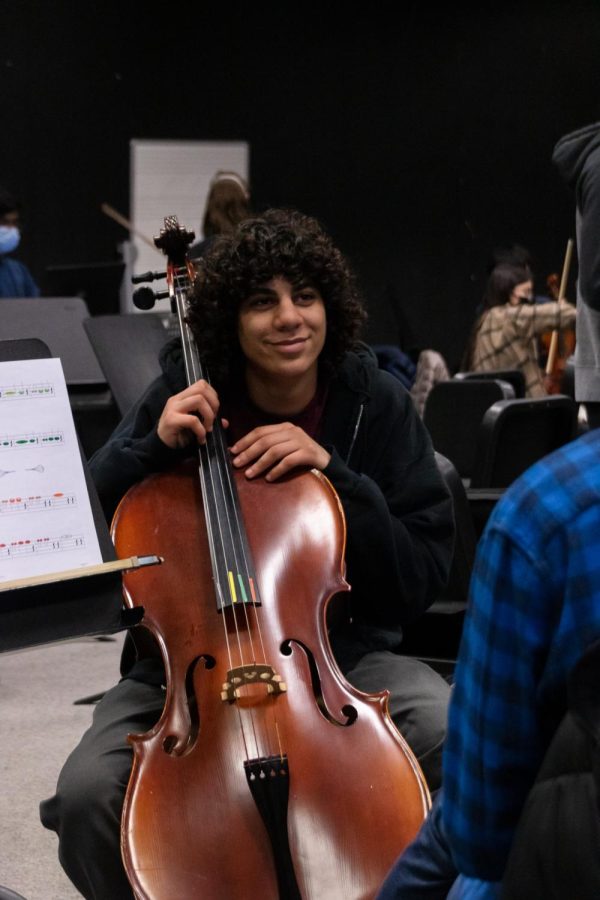
Q: So with this club, how would you say that music is able to serve to bridge gaps and connect people?
A: I think that it is an amazing way of including students into ensemble playing that may not have had the opportunity of being in an ensemble before. The music is a great way for people to connect with one another because it’s a universal language. Sometimes, inadvertently, students get left out, and this is a way of bringing them in. I also think it’s a really good way of building relationships aside from music. Students are making friends with maybe people that they wouldn’t have met without this club and other settings, so music can really bring people together. It’s definitely a way of supporting students with special needs who, maybe, haven’t gotten all the accolades or haven’t gotten a chance to be on teams, getting them a place to play and make friends and express themselves. Also, our ensemble students are getting a lot out of it and learning how to teach and also making new friends and getting a chance to participate in a music activity that really has nothing to do with competition because we’re not focused on perfection. Some of those students who are so worried about their performance and playing up to the best of their ability at all times get a chance to just unwind and play music for the sake of playing music and not to worry too much about like perfection.
Q: What types of changes have you noticed in the students, both the mentors and the students?
A: In general, students are getting a lot more comfortable with one another. I think it always starts with a little shyness and a little awkwardness, but students open up a lot more and just have a lot of fun together. So the club can really make a positive change in terms of building relationships.
Q: So why would you think that activities like these, like you said building relationships, are so important?
A: Relationships are what connect us with our fellow person. I think high school can be a really lonely time for students since they are going through a lot of changes and trying to figure out a lot of things, like taking that next step into adulthood, so having friends and having support and having a community to help kind of connects you with your with other people. I just think it is so important.
Q: Overall, why would you say that students should participate or join the club?
A: I think that it is so much fun, first and foremost. And I think that it gives you a chance to express yourself through music, and it gives you a chance to make some friends and have really fun performance opportunity coming up. Our students are going to join together with our Philharmonic Orchestra and play a piece at our spring concert, which will be so fun. It’s at the Palladium in Carmel, which is just a beautiful concert hall. We’re all really excited about showcasing the work that we’ve been doing in our meetings in that in that concert.
Q: And how can interested students participate?
A: It is a club that’s kind of for orchestra students or mentors and then students with special needs. We recruit at the beginning of each school year. Any student with special needs who’s interested and available on our meetings can participate. I’ll also send out an application for orchestra students specifically since it is the orchestra club. And then we get the number of students who are interested, and then that number has to be directly proportional to the number of musicians because we tried to maintain a three to one ratio. So that’s how it’s done. I would say any new musician who’s interested can contact me. And then orchestra students can listen for the beginning of the year announcement and fill out the application.
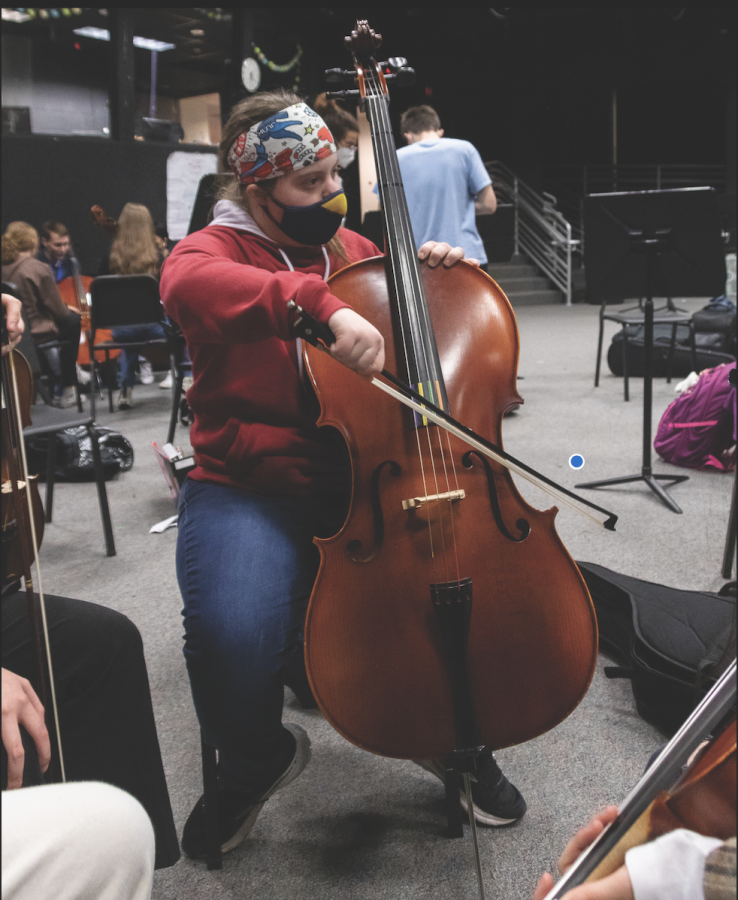
cello at a United Sound
meeting. Ishaan Singh, United
Sound president and junior
said, “It’s a good community
service activity.” (Arthur Mansavage)



















![Joseph Broman, Mu Alpha Theta sponsor, grades tests for his honors precalculus/trigonometry class. Broman said, “I’m retiring from the Math Club next year and I’m just going to do Mu Alpha Theta so I can focus on that one and we can do more [speaker series] first semester.”](https://hilite.org/wp-content/uploads/2024/03/IMG_9502-1200x900.jpg)











![British royalty are American celebrities [opinion]](https://hilite.org/wp-content/uploads/2024/03/Screenshot-2024-03-24-1.44.57-PM.png)




















![Review: “The Iron Claw” cannot get enough praise [MUSE]](https://hilite.org/wp-content/uploads/2024/04/unnamed.png)
![Review: “The Bear” sets an unbelievably high bar for future comedy shows [MUSE]](https://hilite.org/wp-content/uploads/2024/03/unnamed.png)
![Review: “Mysterious Lotus Casebook” is an amazing historical Chinese drama [MUSE]](https://hilite.org/wp-content/uploads/2024/03/0.webp)
![Thea Bendaly on her Instagram-run crochet shop [Biz Buzz]](https://hilite.org/wp-content/uploads/2024/03/IMG_0165-1200x838.jpg)
![Review: Sally Rooney’s “Normal People,” is the best book to read when you are in a time of change [MUSE]](https://hilite.org/wp-content/uploads/2024/03/20047217-low_res-normal-people.webp)
![Review in Print: Maripaz Villar brings a delightfully unique style to the world of WEBTOON [MUSE]](https://hilite.org/wp-content/uploads/2023/12/maripazcover-1200x960.jpg)
![Review: “The Sword of Kaigen” is a masterpiece [MUSE]](https://hilite.org/wp-content/uploads/2023/11/Screenshot-2023-11-26-201051.png)
![Review: Gateron Oil Kings, great linear switches, okay price [MUSE]](https://hilite.org/wp-content/uploads/2023/11/Screenshot-2023-11-26-200553.png)
![Review: “A Haunting in Venice” is a significant improvement from other Agatha Christie adaptations [MUSE]](https://hilite.org/wp-content/uploads/2023/11/e7ee2938a6d422669771bce6d8088521.jpg)
![Review: A Thanksgiving story from elementary school, still just as interesting [MUSE]](https://hilite.org/wp-content/uploads/2023/11/Screenshot-2023-11-26-195514-987x1200.png)
![Review: When I Fly Towards You, cute, uplifting youth drama [MUSE]](https://hilite.org/wp-content/uploads/2023/09/When-I-Fly-Towards-You-Chinese-drama.png)
![Postcards from Muse: Hawaii Travel Diary [MUSE]](https://hilite.org/wp-content/uploads/2023/09/My-project-1-1200x1200.jpg)
![Review: Ladybug & Cat Noir: The Movie, departure from original show [MUSE]](https://hilite.org/wp-content/uploads/2023/09/Ladybug__Cat_Noir_-_The_Movie_poster.jpg)
![Review in Print: Hidden Love is the cute, uplifting drama everyone needs [MUSE]](https://hilite.org/wp-content/uploads/2023/09/hiddenlovecover-e1693597208225-1030x1200.png)
![Review in Print: Heartstopper is the heartwarming queer romance we all need [MUSE]](https://hilite.org/wp-content/uploads/2023/08/museheartstoppercover-1200x654.png)























![Review: Ladybug & Cat Noir: The Movie, departure from original show [MUSE]](https://hilite.org/wp-content/uploads/2023/09/Ladybug__Cat_Noir_-_The_Movie_poster-221x300.jpg)

![Review: Next in Fashion season two survives changes, becomes a valuable pop culture artifact [MUSE]](https://hilite.org/wp-content/uploads/2023/03/Screen-Shot-2023-03-09-at-11.05.05-AM-300x214.png)
![Review: Is The Stormlight Archive worth it? [MUSE]](https://hilite.org/wp-content/uploads/2023/10/unnamed-1-184x300.png)


